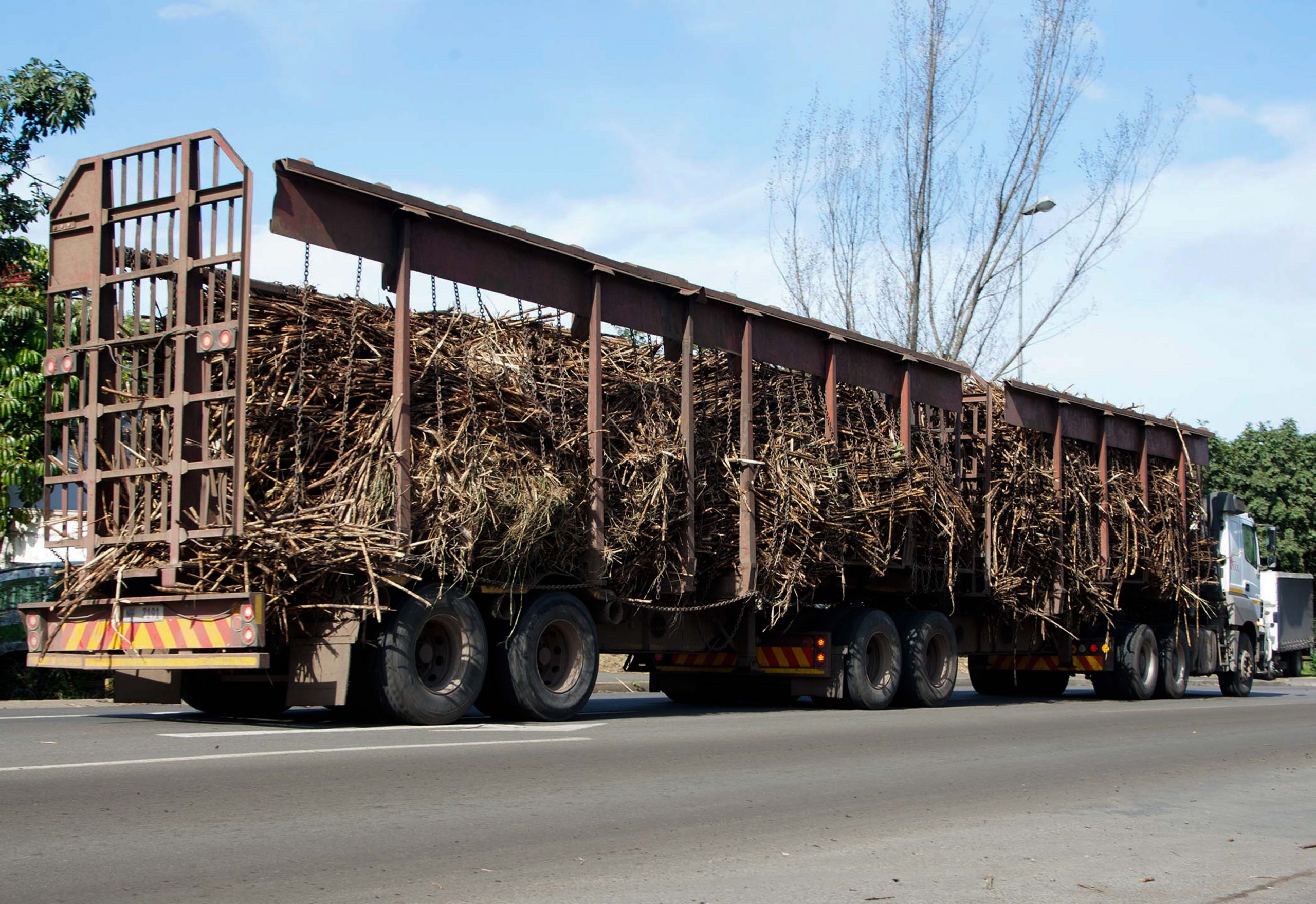Tongaat Hulett workers pay the price
The sugar giant’s profits have fallen and retrenchments are imminent. The crisis will affect not only 5 000 employees but also small-scale growers who depend on the milling firm for their livelihoo…
Author:
18 June 2019

Phumeza* is a mother of four; one of her children is at university and two are in high school. She’s been working for sugar cane giant Tongaat Hulett as a resource centre officer for the past six years. She is based in Amatikulu near Gingindlovu, about 130km northeast of Durban, in Uthungulu District Municipality.
Her office serves four villages within Gingindlovu and on any given day there are at least 20 small-scale sugar cane growers who come there for help. These growers own vast amounts of land, on which they plant sugar cane to sell to Tongaat Hulett. However, they are largely dependent on the assistance they receive from resource centre officers like Phumeza for their businesses to thrive.
“I am hired by Tongaat Hulett to help its stakeholders on the outskirts… I advise small-scale growers on how to plant sugar cane. I make grower codes [reference numbers used to identify individual sugar cane growers when their produce is measured to be sold] and I also advise them on how to keep retention money,” she explained. “Some of them are not schooled, so this office helps them so much.”
Retrenchment ‘never crossed my mind’
Tongaat Hulett is heavily in debt, and there are serious financial discrepancies on its books. The company has acknowledged the growing scandal and admitted that its financial statements for the year ending on 31 March will have to be restated. The board has requested the Johannesburg and London stock exchanges to suspend its listing.
The company’s response to the huge escalation in its debt has been to retrench more than 5 000 workers in the Southern African Development Community (SADC) region in which it operates – and Phumeza is on the retrenchment line.
“It never crossed my mind that I will be retrenched… I always said, even to the growers, that I will retire by myself and nothing else will make me go,” she said emotionally.
She is still fraught with disbelief. “If it’s true that we are getting retrenched, I really don’t know what I am going to do… I couldn’t sleep for two weeks after receiving the news that we will be retrenched.”
Related article:
Phumeza’s husband also works for Tongaat Hulett in Durban. He, too, might not be safe from the cut. They are currently building a home, the walls of which are not yet above window level. She wanted aluminium windows.
“Right now, three different builders dial me almost every day to find out what is happening since I said they must wait. I become emotional and I don’t even know how to speak to them because I might not be able to continue with the house,” she said.
Last year, she bought a car that the bank will repossess if she fails to make the monthly repayments. She’s made peace with that. The ordeal she faces now, along with other families who live in Tongaat Hulett-owned housing in Amatikulu, is what will become of their children who are already enrolled in high school.
Phumeza’s daughter is in grade 11 and will have to drop out of the private school she attends. Phumeza pays R17 000 a year for her daughter’s school fees and if she wants her child to live in the boarding facilities, she has to pay an extra R3 000 every month.
Though she’s aware that resource centre officers are not included in Amatikulu’s newly proposed structure, and she has yet to receive the retrenchment letter due on 18 June 2019, her future, however, is still uncertain.
Unit by unit
Food and Allied Workers Union (Fawu) national organiser in the sugar industry Nkosikhona Nzama told New Frame that the company is retrenching per business operation unit. “The sad part is that whenever there are profits made, employers forget about us, their employees, and they forget about everything. But when times get harder, they remember us,” Nzama said.
He added, “Even the issues that led to this crisis, our members are not the cause of it… There are managers and executive of this business who are to be blamed for this chaos. But unfortunately, our members have to suffer.”
Tongaat Hulett human resource manager Barry Lane told the Association of Mineworkers and Construction Union (Amcu), Fawu and trade union Uasa in an email dated 12 April 2019: “The options being considered indicate possible structural changes across the broad operation and as a consequence may ultimately result in possible redundancies and headcounts reductions and hence the contemplation of retrenchments.”
Nzama said the retrenchments so far have begun with those in the sugar cane rural development unit and agricultural unit. However, some of Tongaat Hulett’s managerial members will also be affected by retrenchments.

‘Now we cross fingers’
Dumezulu* is an extension officer in Amatikulu. He has worked for Tongaat Hulett for more than nine years. His work consists of visiting the small-scale sugar cane growers to take soil samples for analysis and determine which manure is needed and the amount required.
The company will be reducing its extension staff and, as an extension officer, Dumezulu’s future with Tongaat Hulett remains pending and unstable. The company initially proposed that they reapply for the same job and wait to be called for interviews.
“We’ve said let’s do away with reapplying, you can’t knock [to enter] a room which you’re already inside,” Dumezulu said.
Instead, they preferred two selection criteria, which is skill retention and the last in, first out principle.
Skill retention means that those with key, critical skills will have to be retained, regardless of the number of years they worked for Tongaat Hulett. Though he’s been with the company for almost a decade, “I cannot say that I will survive. The future lies in the hands of the management.”
Financial crisis
Tongaat Hulett said the health promotion levy, the sugar tax that the government imposed last year on soft drinks, is one of the causes why the demand for its product has deteriorated remarkably. This along with cheap sugar imports resulted in a loss of profits.
Additionally, the company said its downfall can be accredited to “certain past practices, which are of significant concern to the board and the company’s auditors. These past practices appear to have resulted in financial statements that did not reflect Tongaat Hulett’s underlying business performance accurately.”
In a nutshell, the company’s auditors lied about Tongaat Hulett’s equity. Its value was overexaggerated at R3.5 billion to R4.5 billion. The indebted Tongaat Hulett is selling some of its assets to make “progress in reducing debt, strengthening the balance sheet and improving its liquidity position”.
KwaZulu-Natal member of the executive council for economic development, tourism and environmental affairs Nomusa Dube-Ncube recently visited Tongaat Hulett in an attempt to find a way of averting the possible retrenchments.
She has suggested forming a task team to investigate growth and potential investments.

How sugar cane giants were born
Tongaat Hulett has four mills in South Africa with the capacity to produce more than a million tonnes of sugar a year. Apart from South Africa, this sugar giant operates in Mozambique, Zimbabwe, eSwatini, Botswana and Namibia. The company’s operational land footprint within the SADC region amounts to 570 000 hectares (5 700km²) and it manages half of this land directly.
The story of sugar in what was then Natal, and how companies like Tongaat Hulett came into being, goes back to colonialism. In the epoch of European colonialism sugar cane was a key source of wealth and power. It was first grown with enslaved African labour in the Carribean and the Americas. After slavery was finally made illegal the planters turned to indentured labour from India.
Sugar cane became a large crop in the mid-1850s in Natal and there needed to be a consistent labour force to produce the sugar. However, the Zulu people had no interest in working as labourers on the colonial plantations as they still had their land and political autonomy.
Desperate for labour, the settlers called for a public meeting in which they proposed the importation of indentured workers from India. This resulted in the Coolie Law No 14 of 1895, which made it possible for Indian people to come and work in South Africa under a five-year contract. These workers had been impoverished by the intersection of British colonialism and India’s caste system, so coming to South Africa seemed a better prospect.
By 1911, India had prohibited citizens from coming to Natal because of the ill-treatment of the indentured labourers. While thousands of labourers toiled in the sugar cane fields in the 1850s, it was people like James Liege Hulett who reaped the benefits of their labour.

Ordinary people paying the price
According to the South African Canegrowers Association, 364 041 hectares of South Africa’s land is planted with sugar cane and there are 21 512 cane growers in KwaZulu-Natal and Mpumalanga. More than 20 000 of them are small-scale growers.
Khonzeni Dube, a sugar cane grower from eDokodweni in Gingindlovu, is one of these small-scale growers. She is 72 years old.
Dube sells her sugar cane to Tongaat Hulett and is largely dependent on the services she gets from resource centre officers such as Phumeza. As Tongaat Hulett intends to retrench its resource centre officers, Dube’s future hangs by a thread.
New Frame asked what her reaction was to hearing that people like Phumeza would be retrenched. “My intestines shrunk after hearing this saddening and disturbing news,” she said, visibly angry. “It is very clear that what Hulett does to us is abuse. That office was built for us, those people work for us… Why does Hulett have to abuse us in our ancestors’ land?”
She added, “I don’t see any future of my business. If there is something I want to do with my sugar cane, my step one is that office, which I am told it will be closed. This means that I won’t have to plant and my sugar cane business is not going anywhere. This really tortures my spirit.”
Tongaat Hulett investor relations and communications executive Michelle Jean-Louis declined to comment. Dube-Ncube also declined to comment further about her meeting with Tongaat Hulett, which took place earlier in June.
*Names have been changed.

